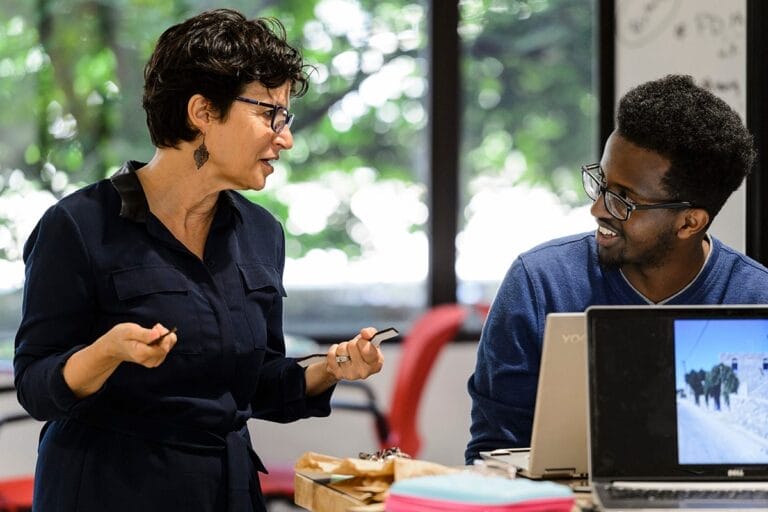
UW–Madison professional degrees and certificates help working adults advance their careers
By almost any measure of professional success, Samuel Cohen was making good progress on his career in 2019. Seven years out of college with an undergraduate degree in media studies, Cohen had moved up through the ranks of designer and communications consultant to advertising associate and was working in advertising operations for GroupM, a large media investment company in New York City.

But he was ready for something more.
Like many professionals, Cohen was looking to advance his career through education, but he needed a program that was flexible and practical. “I needed a program that fit around a full-time job, was affordable and gave exposure to problem-solving skills, data analysis and design,” he says.
He found his solution in the University of Wisconsin–Madison capstone certificate in User Experience Design, an online program in the university’s steadily growing portfolio of Professional Degrees and Certificates.
Cohen represents one of more than 2,800 students who enrolled in a professional degree or certificate program at UW–Madison between July 1, 2019, and June 30, 2020. The university offers more than 85 such professional programs, available online or in accelerated formats on campus, ranging in subjects from business and data science to engineering and health and medicine. More than 1,000 professional degrees and certificates were awarded during this time period.

Marty Gustafson, associate dean for professional degrees and certificates, says UW–Madison’s online programs, in particular, offer working adults the opportunity to expand their knowledge and skills in specific areas to advance in their careers while balancing professional and personal commitments.
“Professional programs are tailored to meeting the needs of working students and their employers,” says Gustafson. “Programs are developed in response to demands within industry for new skills, particularly in growing fields like engineering, information and data, health care and education. Many of our degrees and certificate programs are designed in consultation with professional and industry leaders, so we can build what students are learning to what employers need.”
A professional option
Cohen found it didn’t take long for his online coursework to make an impact in his job.
“[The program] made an immediate and noticeable difference to my supervisors and colleagues and allowed me to select topics that fit with my career and personal interests,” he says. “The opportunity to learn and reinforce those lessons in such a customizable, applied way meant I could jump into new projects and make an impact.”
Designed to prepare someone to work in a particular field, professional programs range from certificates to bachelor’s, master’s, specialist and doctoral degree programs. A number of professional degrees and certificates also meet academic requirements for licensure or accreditation for a variety of professions.
Programs are offered in a variety of formats, too. In fiscal year 2020, 42 of UW–Madison’s professional programs were delivered in person, 13 were delivered as evening/weekend programs, 28 were delivered entirely online and 2 were hybrid, meaning they included both in-person and online courses. (It should be noted, however, that the pandemic did force some in-person programs to meet virtually for a few months.)
Stacking the future
Growing in popularity and availability in UW–Madison’s suite of professional degrees and certificates are what’s known as “stackable credentials” — courses, certificates and degrees that can be built upon one another to earn a higher credential and to further develop career skills.
Cohen, for example, will be using credits he earned in his User Experience Design Capstone Certificate to enroll in UW–Madison’s new Master of Science in Information, which starts online this fall. He says that the ability to transfer his credits from his certificate program to the master’s program made the decision to further advance his education an easy one.
“My career path has been very technology and information-focused, and the opportunity to focus in on and pursue an MS in Information specifically was appealing to me,” Cohen says. “I liked that it was still structured the same, so I can continue to take classes at the same pace.”

Kristin Eschenfelder, professor and associate director of UW–Madison’s School of Computer, Data & Information Sciences (CDIS), says that the MS in Information will provide an avenue for those without a bachelor’s degree in a related field to meet the growing demand for careers in data and information management.
“The program reflects the mission of CDIS to extend access to computing and data-related knowledge to a broader array of students at UW–Madison and to the citizens of state and beyond,” Eschenfelder says.
Educational access
Returning to college, particularly if it’s been a few years (or more!), can take a leap of faith. Cohen admits he was a little nervous about fitting coursework into his already-busy life when he started his User Experience Certificate, but his own organization and the program’s flexibility quickly helped him find his stride.
“Fitting everything in felt very easy to do, and the coursework became part of my routine,” Cohen notes. “For example, I would complete my readings and take notes while on the train to work.” Completing the certificate program, he says, has opened doors for him at GroupM to expand in the areas of technology and design.
Cohen advises others considering a professional degree or certificate to take advantage of the opportunities — from advising and career services to research opportunities and networking — that come with their program.
“These programs are designed to fit with someone who works full time. You can apply the knowledge of what you have with what you are learning to make it relevant to you.”
Visit the Professional Degrees & Certificates website for more information on any of UW–Madison’s professional programs. For questions or to speak with an enrollment coach, please email [email protected] or call 608-400-7459. This article originally appeared in the Can’t Stop a Badger campaign to share positive educational impacts made by UW–Madison.



